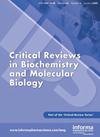损伤耐受途径中PCNA泛素化的时空调控
IF 6.2
2区 生物学
Q1 BIOCHEMISTRY & MOLECULAR BIOLOGY
Critical Reviews in Biochemistry and Molecular Biology
Pub Date : 2019-09-03
DOI:10.1080/10409238.2019.1687420
引用次数: 20
摘要
DNA不断暴露于各种外源性和内源性药物,大多数DNA损伤抑制DNA合成。为了应对复制过程中的这些问题,细胞具有在DNA损伤存在时恢复DNA合成的分子机制,这被称为DNA损伤耐受(DDT)途径。真核生物中DDT途径泛素化调控的概念是通过对酵母酿酒酵母的遗传学研究建立的,其中DDT途径的两个分支通过增殖细胞核抗原(PCNA)的泛素化调控:翻译DNA合成(TLS)和同源依赖性修复(HDR),它们分别由PCNA的单泛素化和多泛素化刺激。在随后的近二十年中,在了解其他真核生物中DDT途径的调节机制方面取得了重大进展。重要的是,TLS本质上是容易出错的,因为大多数受损核苷酸的编码错误以及TLS聚合酶(pol)对未受损模板的不准确复制,而HDR理论上是无错误的,因为DNA合成被认为主要是由pol δ进行的,pol δ是一种精确的复制DNA pol,使用未受损的姐妹染色单体作为模板。因此,调节TLS和HDR通路之间的选择对于确定DNA损伤引起的适当生物学结果至关重要。在这篇综述中,我们总结了目前对PCNA泛素化的物种特异性调控机制以及细胞如何在TLS和HDR之间进行选择的理解。然后,我们为人类细胞中滴滴涕途径的时空调节提供了一个假设模型。本文章由计算机程序翻译,如有差异,请以英文原文为准。
Spatiotemporal regulation of PCNA ubiquitination in damage tolerance pathways
Abstract DNA is constantly exposed to a wide variety of exogenous and endogenous agents, and most DNA lesions inhibit DNA synthesis. To cope with such problems during replication, cells have molecular mechanisms to resume DNA synthesis in the presence of DNA lesions, which are known as DNA damage tolerance (DDT) pathways. The concept of ubiquitination-mediated regulation of DDT pathways in eukaryotes was established via genetic studies in the yeast Saccharomyces cerevisiae, in which two branches of the DDT pathway are regulated via ubiquitination of proliferating cell nuclear antigen (PCNA): translesion DNA synthesis (TLS) and homology-dependent repair (HDR), which are stimulated by mono- and polyubiquitination of PCNA, respectively. Over the subsequent nearly two decades, significant progress has been made in understanding the mechanisms that regulate DDT pathways in other eukaryotes. Importantly, TLS is intrinsically error-prone because of the miscoding nature of most damaged nucleotides and inaccurate replication of undamaged templates by TLS polymerases (pols), whereas HDR is theoretically error-free because the DNA synthesis is thought to be predominantly performed by pol δ, an accurate replicative DNA pol, using the undamaged sister chromatid as its template. Thus, the regulation of the choice between the TLS and HDR pathways is critical to determine the appropriate biological outcomes caused by DNA damage. In this review, we summarize our current understanding of the species-specific regulatory mechanisms of PCNA ubiquitination and how cells choose between TLS and HDR. We then provide a hypothetical model for the spatiotemporal regulation of DDT pathways in human cells.
求助全文
通过发布文献求助,成功后即可免费获取论文全文。
去求助
来源期刊
CiteScore
14.90
自引率
0.00%
发文量
6
期刊介绍:
As the discipline of biochemistry and molecular biology have greatly advanced in the last quarter century, significant contributions have been made towards the advancement of general medicine, genetics, immunology, developmental biology, and biophysics. Investigators in a wide range of disciplines increasingly require an appreciation of the significance of current biochemical and molecular biology advances while, members of the biochemical and molecular biology community itself seek concise information on advances in areas remote from their own specialties.
Critical Reviews in Biochemistry and Molecular Biology believes that well-written review articles prove an effective device for the integration and meaningful comprehension of vast, often contradictory, literature. Review articles also provide an opportunity for creative scholarship by synthesizing known facts, fruitful hypotheses, and new concepts. Accordingly, Critical Reviews in Biochemistry and Molecular Biology publishes high-quality reviews that organize, evaluate, and present the current status of high-impact, current issues in the area of biochemistry and molecular biology.
Topics are selected on the advice of an advisory board of outstanding scientists, who also suggest authors of special competence. The topics chosen are sufficiently broad to interest a wide audience of readers, yet focused enough to be within the competence of a single author. Authors are chosen based on their activity in the field and their proven ability to produce a well-written publication.

 求助内容:
求助内容: 应助结果提醒方式:
应助结果提醒方式:


